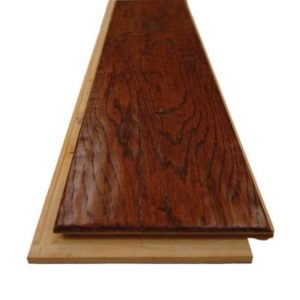 Dallas—American flooring distributors, retailers and importers have formed the “Alliance for Free Choice and Jobs in Flooring” (AFCJF) to resist an attempt by large U.S. manufacturers to slow imports of engineered hardwood flooring from China. According to AFCJF President Jonathan Train, the Alliance was formed during the “Surfaces 2011” flooring trade show, Jan. 25 to 27, in Las Vegas.
Dallas—American flooring distributors, retailers and importers have formed the “Alliance for Free Choice and Jobs in Flooring” (AFCJF) to resist an attempt by large U.S. manufacturers to slow imports of engineered hardwood flooring from China. According to AFCJF President Jonathan Train, the Alliance was formed during the “Surfaces 2011” flooring trade show, Jan. 25 to 27, in Las Vegas.
The new group is actively opposing a petition filed by Mannington, Shaw and other U.S. manufacturers of engineered hardwood flooring at the U.S. International Trade Commission (ITC) and Commerce Department (DOC). The petitioners are asking that the U.S. Government block imported flooring from China by imposing punitive tariffs of 237% or more. The Alliance is seeking to defeat the case by showing the U.S. ITC and DOC why the petitioners’ allegations lack merit.
Train says the Alliance consists of American-owned distributors, retailers, importers and end users of engineered wood flooring as well as hardwood lumber exporters and other affected U.S. companies in related industries. He said “most of the American-owned companies who will be victimized by the petitioners are small and medium-sized businesses.”
Joe DuPree, a member of the AFCJF board of directors, said, “This petition is not so much about China as it is about eliminating American independent distribution and private label programs. Mannington and Shaw are the two largest petitioners in this case and the largest companies in the entire flooring market. If they are successful in restricting imports from China, and ultimately, from elsewhere around the world, it will have the effect of driving the independents out of the market by cutting them off from their source of supply. The real target of this case is not the Chinese, but the first stage of a strategy to hobble the US companies that compete with the petitioners.”
Train agreed, “the real issue in this case is control of the flooring supply chain, which the petitioners conceded in front of the ITC that they no longer control. They lost that all- encompassing influence because the petitioners’ product ingenuity lagged far behind foreign-produced materials in terms of construction and design options.”
“The lower sales volume of U.S. manufacturers that the petitioners blame on imports from China is really attributable to the fact that the U.S. marketplace demands regional product flexibility, and a broader variety of wood species, styles, lengths and finishes other than the U.S. manufacturers offer their customers,” Train continued. “The independent American distributors and importers are delivering what consumers want, specific to their target markets. That’s just entrepreneurial competition. The petitioners prefer to characterize it as ‘unfair trade practices’ but the facts do not support their view.”
Train said the group to educate its members and others in the industry on the complicated matter. “Our primary goal is to see that no new duties are placed on imports. We plan to make an aggressive legal defense at the ITC final and we believe we have a strong chance to defeat the petition.”
Train continued to explain that the secondary objective of the Alliance is to “provide information to the ITC and DOC about real world conditions that will help them see why there shouldn’t be a high duty rate, if any at all.”
The AFCJF feels the two-pronged response is necessary because the ITC and the DOC approach these cases very differently. “In contrast to the ITC, which has found no injury in a number of antidumping and countervailing duty cases against China, the Commerce Department finds dumping in 90 to 95% of the antidumping cases and has never reached a negative dumping determination in an antidumping case against China,” Train said.
“At Commerce, therefore, the objective is to get as low antidumping and countervailing duty rates as possible. At the start of this case, the Petitioners selected the specific sales used to construct the 237% dumping margin in their petition. Now, however, Commerce will look at sales of any and all types of wood flooring items and we are hopeful that with AFCJF’s participation in the case, the Commerce Department will apply the best methodology and calculate the antidumping and countervailing duty rates as accurately as possible. Therefore, if in the unfortunate event the ITC errs by allowing the duties to be applied, we may end up with very low duty rates.”
DuPree asserted as part of the bigger picture, the number of American jobs that would be negatively affected if the petitioners win this case far exceeds the number of factory workers employed by the petitioners.
Train concluded, “Unlike the petitioners, we believe the market should dictate the styles and choices for the consumer rather than protectionist government actions influenced by the Goliath US flooring manufacturers. If free choice and reasonable prices are eliminated in hardwood flooring, then flooring customers—U.S. consumers—will likely drift or be forced down-market to less expensive products such as laminate and vinyl plank which, ironically, are also mostly made overseas.”
